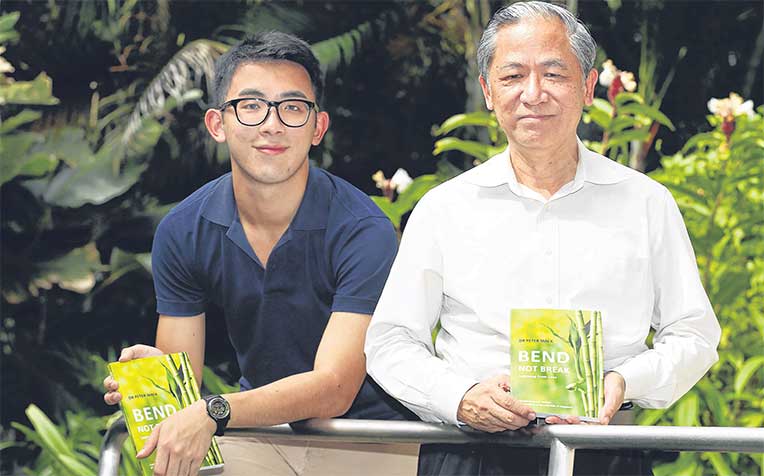
shares how he fell into depression after his best friend’s suicide, in a book written by Dr Peter Mack (right), a senior consultant at Singapore General Hospital. Dr Mack said the way to help someone with suicidal thoughts is simply to listen with compassion.
Even though three years have passed since 17-year-old “Jay” hanged himself in his bedroom, his loved ones are still struggling to cope with the loss.
His best friend Ryan Lim, now 21, a student, lapsed into depression after the suicide. He would get panic attacks whenever a friend parted ways with him as it reminded him of the last time Jay said goodbye before going home.
Mr Lim later started cutting himself and had suicidal thoughts.
As for Jay’s parents and brother, they tried to cope by moving to HongKong to “start life afresh”. “One thing suicide victims may not realise is that they are not the only ones who die,” said Jay’s brother. “We die a little inside every day.”
Brahm Centre, a charity that champions mental resilience, will be launching a book tonight that captures personal accounts of Jay’s best friend and brother on the events that led up to his suicide and its impact on them.
The book, titled Bend Not Break –Learning From Loss, also discusses the phases of psychological development in adolescence and how parents can nurture emotional resilience in their children.
“The book is a valuable addition as we seldom have the opportunity to listen to the voice of suffering first-hand under such circumstances,” wrote the late former president SR Nathan in its foreword.
“I believe it will be an easy and yet valuable read for all parents, siblings and teachers,” said Mr Nathan, who was supposed to launch the book, but died last month.
Senior Minister of State for Health, and the Environment and Water Resources Amy Khor will be gracing the launch instead.
Teen suicide has come under the spotlight after the number hit a 15-year high last year with 27 cases.
This was double that in 2014, despite a drop in the overall number of suicides.
Of concern, too, are the “suicide survivors” – who can be anyone affected by a suicide death, including the family, friends, neighbours, colleagues, classmates or healthcare providers.
From 2013 to last year, Samaritans of Singapore (SOS) has seen a rising number of clients who come in for suicide grief counselling.
More than half of them have suicidal thoughts due to their loss. SOS has a programme and support group for these survivors.
About 300 to 400 Singaporeans kill themselves annually. With SOS’ conservative estimate of six people affected by every suicide death, this means thousands of people grappling with such losses each year.
“Bereavement following suicide is usually different from bereavement following death by natural causes, both in kind and intensity, and there is much greater trauma,” said SOS executive director Christine Wong.
Many suicide survivors face a heightened risk of suicide themselves because they experience intense feelings of guilt, abandonment, shame and anger, on top of the usual sadness and loneliness.
In Mr Lim’s case, he has since come to terms with his friend’s death with the help of a therapist and psychiatrist.
The book’s author, Dr Peter Mack, a senior consultant at Singapore General Hospital, said what can be done to help someone struggling with suicidal thoughts is simply to listen with compassion.
He recounted how he had just met a woman who was planning to end her life a fortnight ago. She happened to read about the book launch and contacted him.
“All I did was to listen with the sole intent to understand her – not to evaluate, judge or advise her on what to do,” he said. “Your best gift to someone who is struggling is your time and reassurance: Be a compassionate listener and don’t offer solutions.”
Helplines
Samaritans of Singapore:
1800-221-4444
Singapore Association for
Mental Health:
1800-283-7019
Institute of Mental Health’s
Mobile Crisis Service:
6389-2222
Care Corner Counselling
Centre (Mandarin):
1800-353-5800
Silver Ribbon: 6386-1928
Tinkle Friend (for primary
school-aged children):
1800-274-4788
Contributed by














 Get it on Google Play
Get it on Google Play